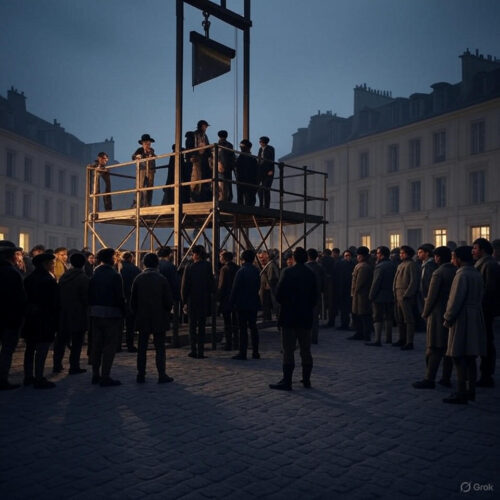Imagine a world teetering on the edge of chaos, where the air is thick with the scent of gunpowder and fresh ink, and the echoes of guillotines mingle with the cheers of a crowd hungry for change. It’s September 22, 1792, in Paris, and the French Revolution – that whirlwind of ideas, blood, and unyielding ambition – reaches a pivotal crescendo. On this day, the National Convention, a ragtag assembly of revolutionaries, poets, lawyers, and firebrands, stands in the shadow of the guillotine and declares what was once unthinkable: France is no longer a kingdom ruled by divine right. It is a republic, a bold experiment in self-rule where the people, not a crowned head, hold the reins of destiny. This wasn’t just a political pivot; it was a seismic shift that reshaped Europe, inspired global democracies, and planted the seeds of modern liberty. But beyond the grand narratives of history books, what does this distant thunderclap mean for you, right here in 2025, as you navigate your own battles for autonomy? Buckle up, history buff – we’re diving deep into the details of that fateful day, unearthing the gritty truths, the human follies, and the electric triumphs. And then, we’ll forge those ancient flames into a personal blueprint for breaking free from your own invisible tyrants. Let’s march into the past, shall we?
The French Revolution didn’t erupt overnight like a summer storm; it brewed for decades in the fetid underbelly of an ancien régime that squeezed the life out of its people. Picture Versailles in the 1780s: a glittering palace of excess where Louis XVI and Marie Antoinette hosted balls that cost more than entire villages earned in a year. While the royal family dined on pheasant and champagne, peasants in the countryside starved, their fields ravaged by poor harvests and crippling taxes. The year 1788 brought a brutal winter, freezing the Seine and turning bread prices sky-high. Riots flickered like sparks in dry tinder – the Réveillon riots in Paris that April left hundreds dead as workers clashed with troops over wages. By May 1789, the Estates-General – that dusty medieval assembly representing clergy, nobility, and commoners – convened for the first time in 175 years. But the Third Estate, the commons, chafed under the voting system rigged to favor the privileged. On June 17, they declared themselves the National Assembly, vowing to draft a constitution. June 20 saw the Tennis Court Oath, where 576 deputies crammed into a Versailles squash court, swearing not to disband until France had a new order. It was theater, yes – sweaty, defiant theater – but it lit the fuse.
The summer of 1789 exploded. On July 14, the Bastille fell, its storming a symbol of toppled tyranny, though in truth, only seven prisoners were freed amid the chaos of 988 attackers. Blood flowed: the Great Fear swept rural France, peasants torching châteaus and feudal records in a frenzy of liberation. August brought the Declaration of the Rights of Man and of the Citizen, a manifesto echoing Enlightenment giants like Rousseau and Voltaire, proclaiming liberty, property, security, and resistance to oppression as inalienable. But reform was a slippery beast. Louis XVI, that indecisive king with a jaw like a lantern and a heart for hunting hounds more than hungry mouths, played both sides. He approved the Declaration but plotted with foreign monarchs to crush the uprising. By October, a mob of 7,000 market women marched on Versailles, dragging the royals back to Paris in a tumbrel, the people’s coach of humiliation.
1790 and 1791 simmered with structural upheavals. The Civil Constitution of the Clergy nationalized church lands, turning priests into civil servants and alienating Catholic Europe. Emigres – nobles fleeing with their silver – whispered of counter-revolutions from Coblenz. The king’s failed Flight to Varennes in June 1791, a botched escape disguised as a Russian baron, exposed his treasonous leanings. Parisians jeered him upon return, stuffing his mouth with dirt in effigy. The Legislative Assembly, elected that fall, teetered between moderates (Feuillants) and radicals (Jacobins, Cordeliers). Factions proliferated: the Girondins, eloquent provincial lawyers dreaming of decentralized power; the Mountain, hardline Parisians like Robespierre, Danton, and Marat, baying for blood to purify the nation.
War loomed like a gathering storm. In April 1792, France declared war on Austria and Prussia, allies of the emigres, hoping victory would unify the fractious republic-in-waiting. But defeats mounted: General Théobald Dillon’s head spiked on a pike after a rout at Lille; the Duke of Brunswick’s manifesto threatened Paris with annihilation if the royals were harmed. August 10 saw the storming of the Tuileries Palace – Swiss Guards massacred, Louis XVI fleeing to the Legislative Assembly like a scolded schoolboy, his chambers sacked and his Swiss protectors’ entrails paraded on pikes. The Assembly dissolved itself, calling for a National Convention to draft a republic. Elections in late August and early September were feverish: universal male suffrage for the first time, though turnout was low amid the terror.
Enter September 1792, the cruellest month. Prussian armies inched toward Paris; rumors swirled of massacres in the Vendée. The September Massacres gripped the city from the 2nd to the 7th – a spontaneous purge where sans-culottes, those working-class militants in red caps and sans breeches, stormed prisons and slaughtered over 1,400 inmates suspected of counter-revolutionary plots. Priests garroted in the Abbaye; Swiss Guards hacked apart in La Force. Marat’s blood-soaked Ami du Peuple egged them on, but even he later distanced himself. It was mob justice, raw and unfiltered, a warning that the Revolution devoured its enemies without mercy. Amid this carnage, the National Convention convened on September 20 in the Manège, a riding school turned debating hall, its walls echoing with the clop of phantom hooves.
The Convention was a powder keg of personalities. Maximilien Robespierre, the incorruptible lawyer from Arras with a powdered wig and a voice like ice, sat high in the Mountain. Georges Danton, the thunderous orator with a pockmarked face and a booming laugh, rallied the center-left. Jean-Paul Marat, the radical journalist scarred by eczema and ideology, scribbled from his medicinal bath. The Girondins, led by Pierre Vergniaud and Jacques-Pierre Brissot, pushed for a federated republic, wary of Paris’s dominance. Over 750 deputies crammed the hall, many in tricolor sashes, others nursing hangovers from victory toasts after the Battle of Valmy on September 20 – that muddy miracle where General Kellermann’s cannonade halted the Prussians, Goethe himself declaring, “From this place and this day forth commences a new era in the world’s history.”
September 21 dawned with procedural squabbles: who speaks first? Oaths of loyalty? But the air crackled with destiny. Deputy Henri Grégoire, a defrocked priest turned revolutionary, proposed abolishing the monarchy outright. Debate erupted like fireworks. Conservatives like Adrien Duport argued for a regency; radicals countered with the people’s will. Danton thundered for purity: “The people have given us a mission – to found a republic!” Votes flew: 453 for abolition, a landslide. The hall erupted in cheers, embraces, tears – grown men weeping as the tricolor waved. But the true thunderclap came the next day, September 22.
It was a Saturday, gray and drizzly, the Seine lapping indifferently at the Quai des Tuileries. The Convention reconvened at 9 a.m., the hall stuffy with pipe smoke and unwashed fervor. Philippe Fabre d’Églantine, a poet-playwright with a flair for the dramatic, rose to propose the calendar’s rebirth. Why cling to Gregorian shackles tied to saints and tyrants? He unveiled the French Republican Calendar: Year One begins now, months rechristened Vendémiaire (vintage), Brumaire (mist), Frimaire (frost), and so on, each day named for fruits, tools, or beasts – today, the 1st of Vendémiaire. It was whimsy amid war, a cultural coup to erase the old world’s fingerprints. Laughter rippled; approval thundered. Then, the decree: “The French people are represented sovereignly by the National Convention, which decrees: The French Republic is from this day proclaimed.” Scribes scratched quills across parchment; seals stamped wax. Bells pealed from Notre-Dame, cannons boomed 21-gun salutes from the Invalides. Crowds surged in the Place de la Révolution, bonfires blazing, songs of fraternity on lips. Marie Antoinette, peering from Temple Prison, must have felt the chill of history’s turning page.
But proclamation was no panacea. The Republic’s infancy was colicky. On December 11, Louis XVI’s trial began – that hapless king, now Citizen Louis Capet, defending himself with draftsman’s precision but a statesman’s timidity. January 15, 1793: guilty of treason. January 21: the guillotine’s blade fell at noon, his head held high by executioner Charles-Henri Sanson, blood spraying the scaffold as 20,000 watched in stunned silence. Europe recoiled; Britain, Holland, Spain declared war. The Vendée rose in royalist revolt, a guerrilla hell of scorched earth and noyades (drownings in the Loire). The Mountain seized control, the Committee of Public Safety birthed in April – Danton its early architect, Robespierre its eventual puppeteer.
The Reign of Terror, from June 1793 to July 1794, was the Republic’s dark baptism. The Law of Suspects snared anyone vaguely suspect: aristos, priests, even moderates like the Girondins, 22 of whom tumbled to the blade in October 1793. Paris’s guillotine, that “national razor,” claimed 2,639 heads; provinces tallied 16,594 more. Marat fell to Charlotte Corday’s knife on July 13, 1793, his bath a crimson altar. Danton, once terror’s champion, faced it himself in April 1794, quipping to the executioner, “Show my head to the people – it’s worth seeing.” Robespierre, the virtuous vigilante, escalated with the Cult of the Supreme Being, a deist pageant on June 8, 1794, where he paraded in plumed hat like a green demigod. But paranoia consumed him; rivals toppled him on 9 Thermidor (July 27), his jaw shattered by grapeshot the next day.
Thermidor’s backlash birthed the Directory in 1795 – five scheming directors in silk stockings, corruption rife, inflation rampant. Napoleon Bonaparte, that Corsican comet, rose in the coup of 18 Brumidor (November 9, 1799), trading republic for empire. Yet the Republic’s DNA endured: the Code Napoleon spread legal equality; its ideals fueled 1848’s springs, 1789’s echoes in Haiti, and America’s own democratic tweaks. From Moscow to Mexico City, September 22, 1792, whispered that power need not descend from heaven – it can rise from the street.
Now, rewind that tape and zoom in on the human mosaic. Consider the women: Olympe de Gouges, penning her Declaration of the Rights of Woman in 1791, executed in 1793 for daring equality beyond men. Or Théroigne de Méricourt, the “Amazon of the Revolution,” leading charges in trousers, later confined to Charenton asylum, her mind fractured by the cause she championed. The sans-culottes: artisans like Simon the shoemaker, who schooled the Dauphin in republican oaths, or the enragés like Jacques Roux, preaching economic terror against hoarders. Foreign eyes watched: Thomas Paine, the Rights of Man author, elected to the Convention, barely escaping the Terror with American citizenship as shield. Even the calendar’s quirks amuse – floréal for flowers, but who named a month after a sickle? It was poet Sébastien Le Prestre’s fancy, blending utility with utopia.
Details abound in the archives: the Convention’s minutes, scrawled in haste, reveal petty squabbles – who pays for the firewood? – amid world-shaking votes. Valmy’s mud saved Paris; Kellermann’s artillery, forged in foundries manned by women and children, barked defiance. The massacres’ horror: in the Conciergerie, a noblewoman strangled with her own pearls. Yet glimmers of genius: Lazare Carnot, the “Organizer of Victory,” conscripting 300,000 levée en masse, turning peasants into phalanxes that repelled coalition armies at Fleurus and beyond.
This torrent of transformation wasn’t flawless – far from it. The Republic birthed equality but devoured dissent; fraternity flourished in clubs like the Jacobins’ 5,000-strong debates but frayed in purges. Still, its core – sovereignty of the people – endures as a beacon. From the rubble of feudalism rose a creed: no man is born to rule another by bloodright. Governments derive from consent, rights from reason. It toppled thrones from Lisbon to Naples, inspired Bolivar’s South American liberations, and even echoed in the UN’s Universal Declaration.
But enough of epochs and empires – let’s sharpen this blade for your life. The French Republic’s birth teaches that radical reinvention isn’t reserved for history’s stages; it’s a daily drill for the soul. On September 22, 1792, delegates didn’t just vote – they voted to dismantle the self-evident truths of their upbringing. Monarchy was god-given; suddenly, it was a construct, shatterable. Today, your “monarchy” might be a dead-end job, a toxic relationship, or the inner voice dictating “this is just how it is.” The outcome? A world where individuals seized agency, birthing resilience, innovation, and unapologetic self-determination. Apply this: audit your life for feudal holdovers – habits, beliefs, systems that extract without consent. Storm your personal Bastille. Here’s how, in razor-specific bullets, followed by a 30-day plan to embody republican fire.
– **Audit Your Inner Estates-General**: List three “privileges” in your routine (e.g., scrolling social media for validation like nobles preening at court). For each, calculate the “tax” – hours wasted, energy sapped – and vote to abolish one, replacing it with a “Third Estate” pursuit like journaling ideas that spark joy.
– **Tennis Court Your Commitments**: When faced with a draining obligation (family guilt-trip or boss’s micromanaging), channel the Oath: swear mentally, “I will not yield until this serves my sovereign self.” Negotiate boundaries – say, “I’ll handle X if Y is delegated” – turning passive duty into active constitution-building.
– **Storm the Tuileries of Doubt**: Identify a self-sabotaging belief (e.g., “I’m not leadership material,” echoing royal absolutism). Rally your “sans-culottes” – allies or affirmations – for a daily assault: visualize toppling it with evidence of past wins, then act: pitch that idea at work, as if marching on Versailles.
– **Proclaim Your Personal Vendémiaire**: Redefine your calendar – rename a draining week (e.g., “Brumaire of Bills”) to “Floréal of Freedom,” focusing on one harvestable goal like skill-building. Track progress in a “Convention Journal,” celebrating small decrees like finishing a course module.
– **Massacre Mediocrity’s Prisoners**: In your mental prison (procrastination cells), execute “suspects” – distractions like binge-watching. Use the Terror’s ruthlessness wisely: set a 5-minute timer to start tasks, guillotining excuses mid-thought, freeing energy for revolutionary pursuits like networking or side-hustles.
– **Channel Danton’s Oratory for Self-Advocacy**: Practice booming your worth – rehearse a salary negotiation script aloud, thundering like Danton: “My contributions demand this elevation!” Deliver it with fire, turning whispers into world-altering asks.
– **Embrace Robespierre’s Incorruptibility in Ethics**: In a world of ethical gray (e.g., cutting corners at work), vow purity: define three non-negotiables (honesty, growth, kindness) and audit weekly. When tempted, recall the Supreme Being – your higher purpose – and act accordingly, building unshakeable integrity.
– **Navigate Thermidor’s Backlash Gracefully**: After big changes (quitting a job), expect pushback (friends’ doubts like Directory corruption). Counter with Carnot’s organization: build a support phalanx of mentors, reviewing progress monthly to fortify gains.
– **Declare War on Stagnation**: Like France vs. coalitions, declare “war” on inertia – pick a skill (coding, public speaking) and levy your “en masse”: 15 minutes daily. Track victories like Valmy, turning defeats into strategic retreats.
– **Cultivate Fraternity in Isolation**: Join or form a “Jacobin Club” – a mastermind group of 3-5 peers – meeting biweekly to debate goals, sans judgment. Share “manifestos” of ambitions, fostering the bonds that sustained revolutionaries through terror.
Your 30-Day Republican Reinvention Plan:
**Days 1-7: The Estates Assembly (Foundation)**
Convene your inner convention: Spend 20 minutes daily journaling life’s “feudal taxes” – finances, relationships, health. Vote on three reforms (e.g., budget audit, boundary-setting call, gym vow). End each day with a mini-Oath: “I swear fidelity to my sovereign potential.”
**Days 8-14: The Bastille Assault (Action)**
Storm one barrier: If it’s career, update your LinkedIn and apply to two roles, scripting interviews with revolutionary zeal. Track “prisoner releases” – moments of liberation, like saying no to overtime. Celebrate with a solo toast to Year One of You.
**Days 15-21: Valmy’s Stand (Resilience)**
Face “Prussian” pushback: When doubt charges, deploy Kellermann’s cannon – affirmations backed by evidence (past successes listed). Dedicate time to skill drills; read a Revolution bio (try Simon Schama’s *Citizens* for grit). Rally allies for feedback volleys.
**Days 22-30: The Proclamation and Beyond (Legacy)**
On Day 22, mirror history: Write your Personal Republican Decree – a one-page manifesto of freedoms claimed (e.g., “I proclaim autonomy over my narrative”). Share it selectively. Days 23-30: Execute with Thermidor tweaks – adjust for slips, organize “victories” into habits. End with a Frimaire feast: reflect on growth, plot Year Two.
This isn’t fluffy motivation; it’s forged in 1792’s forge – practical, potent, proven by history’s survivors. The Republic fell to emperors and exiles, but its spirit? Eternal, adaptable, yours to wield.

Whew, we’ve traversed bloodied streets and ink-stained halls, but the Revolution’s pulse beats on. Dive deeper? The archives brim: the Bibliothèque Nationale holds Convention transcripts, yellowed and fervent. Or wander Paris’s Conciergerie, where Marie Antoinette paced her final nights. Fun fact: the Republican Calendar lasted 12 years before Napoleon scrapped it – too chaotic, even for him. Yet its legacy? Metric system, decimal time trials (100-minute hours!), a stab at rational reinvention.
Consider the global ripples. In 1798, Napoleon exported the Republic to Egypt, his Rosetta Stone unlocking hieroglyphs and hearts. Haiti’s Toussaint Louverture, enslaved then emancipator, drew from 1792’s decree to forge the New World’s first Black republic in 1804. Even in 19th-century Italy, Mazzini’s Young Italy toasted September 22 as unification’s spark. Britain’s Reform Acts of 1832 owed a nod; America’s abolitionists, like Frederick Douglass, cited French equality to shame slavery’s chains.
Back to the grit: the Convention’s diversity stunned contemporaries. Deputies from Arles fishermen to Lyon silk-weavers, ages 24 to 72. Women barred from voting but vital in salons – Madame Roland, the Girondin muse, whispering strategies from her Plaine salon, later guillotined with a parting shot: “O Liberty, what crimes commit in thy name!” Food scarcity bit hard: bread riots in February 1793, deputies rationing to solidarity. Health woes too – typhus in prisons, Marat’s skin afflictions from sulfur baths.
The calendar’s rollout was farce and fervor. Primers printed en masse, days like “gooseberry” or “yoke” replacing saints. Thermidor’s heatwave in 1794 saw fêtes disrupted by rain, much like today’s glitchy launches. But it symbolized rupture: no more Easter Mondays; hello, décades of 10-day weeks for atheistic rhythm.
Post-Terror, the Directory’s frolics contrast sharply – balls in frock coats, but underlying rot: assignats hyperinflating to wallpaper value. Bonaparte’s 1799 coup? A thermidorian reaction on steroids, yet his plebiscites echoed republican consent.
For your arsenal, remember Paine’s quip: “My country is the world; my religion is to do good.” Apply it – volunteer for a cause, channeling enragé energy into eco-cleanups or literacy drives. Or, in business: found a “republican startup,” flat hierarchy where ideas, not titles, rule.

The Revolution’s soundtrack? Ça Ira’s jaunty “Ah! ça ira, ça ira, les aristocrat’ à la lanterne!” – aristos to the lamppost. Sing it during workouts; it’s instant adrenaline. Art bloomed too: David’s tennis court canvas, epic and earnest, now Louvre star.
Economically, 1792 upended: feudal dues abolished, guilds smashed for free markets – precursor to Smith’s invisible hand, though chaos ensued. Land redistributed: emigres’ estates auctioned, creating a bourgeoisie bonanza.
Women’s roles evolved fitfully. The Society of Revolutionary Republican Women, led by Claire Lacombe, demanded price controls and rights, dissolving under Montagnard suspicion. Yet seeds sown: 1944’s suffrage traced here.
Internationally, coalitions formed: First (1792-97) with 300,000 Prussians alone; France’s levée countered with fervor, women sewing uniforms, children forging bayonets.
Robespierre’s fall? A whisper campaign – his “Great Terror” fears – leading to arrest mid-speech. His execution, jaw bandaged, brother Augustin leaping to death beside him: tragic coda.
The Directory’s five: Barras the intriguer, Carnot the strategist, Letourneur the placeholder, La Révellière the mystic, Merlin the jurist. Corruption peaked: directors’ mistresses hawking offices.
Napoleon’s arc: from Toulon hero (1793, blasting royalists) to emperor (1804), but his 1812 Russian folly echoed Brunswick’s bluster.
Legacy metrics: France’s population grew 50% by 1850, literacy doubled. Globally, 100+ republics today owe DNA to 1792.
For fun: imagine time-traveling – what to tell Danton? “Brevity is the soul of wit; skip the excess.” Or Louis: “Hunt reforms, not deer.”

Motivational pivot: The Republic proves reinvention’s cost – blood, yes, but bounty in freedom. Your “Terror”? The discomfort of change, but harvest? Empowered life.
Extend bullets:
– **Brumaire Your Budget**: Mist-shrouded finances? Decree transparency: track every sou like assignats, investing in “revolutionary funds” – index funds echoing Carnot’s logistics.
– **Frimaire Fitness Frost**: Cold snaps of motivation? Frost-proof with routines: 10-minute HIIT named “Mountain Marches,” building endurance like Vendée veterans.
– **Nivôse Nourishment Snow**: Snowy isolation? Stockpile “grains of gratitude” – daily three thanks, melting doubt like spring thaws.
– **Pluviôse Precipitation of Projects**: Rainy ruts? Channel deluge into flow: brainstorm 10 ideas weekly, pruning like guillotine efficiency.
– **Ventôse Wind of Networking**: Windswept connections? Gust into events, “blowing” value first, reaping alliances.
– **Germinal Seed Sovereignty**: Germinate goals: plant one habit seed (meditation), nurture with daily waterings.
– **Floréal Bloom Boldness**: Flower in risks – pitch that novel, petals of praise unfolding.
– **Prairial Meadow Mentorship**: Graze wisdom: seek a “Roland” guide, meadows of mutual growth.
– **Messidor Harvest Hustle**: Reap rewards: review quarterly, sickle unused talents.
– **Thermidor Heat of Reflection**: Summer sizzle? Cool with audits, preventing overheat.

Plan extension: Post-30 days, annual “Convention” – September 22 ritual: review manifesto, adjust decrees.
Humor in history: The calendar’s “cat” day? Catastrophes abounded. Or Fabre d’Églantine’s later forgery conviction – poetic justice.
Cultural exports: Tricolore’s spread; “Liberté, Égalité, Fraternité” motto, adopted 1848.
In science: Lavoisier’s oxygen work, executed 1794 – “Republic needs no savants,” they said. Irony: his taxes funded it.
Military genius: Conscription’s scale – 800,000 by 1794, birthing modern armies.
Social shifts: Divorce legalized 1792, equality in splits – ahead of its time.
The Convention’s end? 1795 constitution, bicameral but short-lived.
For you: Let 1792 be your clarion – proclaim your republic daily.


